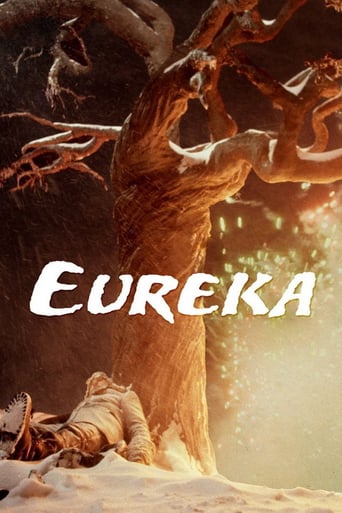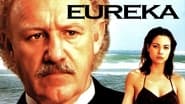Petri Pelkonen
Jack McCann is a Klondike prospector who one day in 1925, after 15 years of searching, falls into a mountain of gold.He becomes one of the wealthiest men in the world.In 1945 he lives in luxury on a Caribbean island.He's married to Helen, who drinks a lot.His daughter Tracy is married to a man named Claude, who Jack doesn't trust.And there are some Miami mobsters who want his island to build a casino.It seems to him that everybody is after his money.Eureka (1983) is directed by Nicolas Roeg.The story is loosely based on the true murder of Sir Harry Oakes in the Bahamas in 1943.Gene Hackman does a solid job as Jack McCann.Without Hackman's performance this would be a much poorer film.Today this great, now retired actor turns 80, so congratulations.Theresa Russell is great as his daughter, Tracy McCann Maillot Van Horn.Rutger Hauer is terrific as Claude Maillot Van Horn.Jane Lapotaire does very good job as the wife Helen.Mickey Rourke is marvelous as Aurelio D'Amato.Ed Lauter is great as Charles Perkins.Joe Pesci is brilliant as Mayakofsky.The movie offers some decent drama, especially due to Jack McCann's character.Hackman's character seems like a rich man, but yet he's poor.His fear for his wealth and his soul make him that way, alienating him from those that are close to him.The scene where Jack is being murdered, is most brutal.His corpse is being partially incinerated and strewn with feathers.The movie could have been better, sure.I had the greatest time in the beginning, watching him searching for that gold.But nevertheless, quite fascinating movie.
fedor8
Somehow Roeg's themes tend to be better than the films themselves. He often picks original and unusual stories, but once again the result on the screen is disappointing. Not terribly interesting, even dull at certain parts in the first half, plus it's messy and not always convincing.It starts off with a reasonable twenty or so minutes in Alaska (or wherever), then goes nowhere for a while, with sometimes pointless and sometimes boring dialog. The second half gets confusing, with scenes just being piled up without any kind of sequence that would make sense. The courtroom scenes are tedious, throwing yet more confusion. Is Russell a part of Pesci's plan? Was she in on it? If not, why did she sleep with Rourke? If she wasn't in on it, then somehow her affair with Rourke doesn't make sense; she said something in her never-ending courtroom speech about having affairs herself, sleeping around with men. Was that supposed to clarify her sleeping with Rourke while her husband was on trial for murder? It doesn't quite wash. Her impassioned dialogue with her husband, acting as his own attorney, goes on forever but unfortunately also goes nowhere. After this speech, we understand both her and the plot even less. Then Hauer gets surprisingly acquitted, and he and Russell have a little talk in the last part, which doesn't really do much in the ways of shedding some light on anything.But easily the messiest part of the movie is the entire night of the murder; scenes of ritualistic natives' orgy mix with Hackman going around the island, first searching for Hauer and Russell and then bumping (literally, with his car) into his business partner. Hackman is lead to Pesci's men, but refuses to sign a contract, and this entire scene with him and the gang members is unconvincing and almost silly. Hauer JUST HAPPENS to be there and witnesses this meeting (I know it's an island, but surely it isn't only ten meters wide), and Hackman somehow sees him. Beforehand, Hauer had taken part in the afore-mentioned orgy, and escorts some women and a guy away from it, telling them not to talk about it.The whole thing appears disorganized, disconnected and lacks flow. The same goes for the scenes leading up to the ensuing murder of Hackman, which are just scenes piled one on top of another, as though put together by an editor drunk out of his mind. At the end of the film we hear Hackman's words again, something about gold or whatever. I have no idea what Roeg's point was; too many things here don't add up. The typically Roegian emphasis on the supernatural didn't help either. Hauer is very good. A film that strives for some "profound message", but fails to deliver it (if it even has one).
wilderfan
Based loosely on an famous unsolved murder mystery (the multi-millionaire Sir Harry Oakes, who was brutally killed at his island retreat), Nicolas Roeg's "Eureka" takes this bare bones idea and transforms it into one of the most daring, ambitious and insightful films of all time. The film's screenwriter Paul Mayersberg packs each line of dialogue with thematic clues. The opening half hour is so stunning that it makes your head swim- the camera sweeps into the snowfields of British Colombia whilst Stanley Myers' hauntingly repetitive theme throbs on the soundtrack. Jack McCann (Gene Hackman) is prospecting for gold and ditches his partners. Surrounded by wolves, he gets a small talisman that he takes back to a brothel. The madam Frida fortells the future: "You'll find what you're looking for. But afterwards?" Jack sets off and discovers the gold (a genuinely amazing sequence). His ecstasy is short lived when he returns to his dying mistress. A burst of flame shoots forth and the film cuts to twenty years later when Jack is nostalgically telling the story to his daughter Tracy (Theresa Russell). Tracy is in love with an insubstantial dilettante Claude Mio Van Horne (Rutger Hauer), who Jack loathes. At that moment in time Tracy is looking forward, Jack is looking back. Jack is bored. He says "Once I had it all. Now I only have everything". He is aware that his daughter is his soul-clone. On the surface, they appear quite different- he's bitter, she's a hedonist. Yet small details (both admonish Jack's alcoholic wife Helen to "lay off the sauce" and they both have a stunning gift for mathematics) tell the truth. They understand each other perfectly. Jack is under siege from a pack of wolves who come in the shape of gangsters who want to develop Jack's island. Eventually the gangsters and Claude invade the house and Jack is brutally murdered. After this terrifying yet beautiful sequence, the film becomes more problematic. The courtroom scenes that follow contain dialogue that spells out the movie's themes and Russell's performance is hysterical. But the punchline as Tracy emasculates her husband is a doozy: "Claude...they despise you because you have me and I'm worth having. They despise me because I'm Jack's daughter and I have too much. And of course, they still despise Jack because he found what they're all still looking for". The movie atones for a lot with its gorgeous final moments as Claude paddles away. It's difficult to articulate the power this movie has. It has an extraordinary power to sweep you away- it's a crazy, violent, lovely, magical experience. It's about the human condition and it deals with issues that are almost never talked about- the price we pay for getting what we want, the moments in life where we find our purpose, the essence of people that is passed down through the generations, the difference between old and new souls. The film's main flaws (clumsy dialogue) are directly linked to the main virtue (the sheer overwhelming density of the material). Its a movie that will speak to you personally or leave you cold (there's no middle ground) and I find it almost an affront when somebody doesn't respond positively to it.
Jonathon Dabell
Quite a cast isn't it? Gene Hackman, Rutger Hauer, Jane Lapotaire, Theresa Russell, Mickey Rorke, Ed Lauter and Joe Pecsi, all in one film. Directed by Nicholas Roeg, who masterminded the classic Walkabout and Don't Look Now. Based on a riveting true story about a mega-rich gold prospector, Harry Oakes, who was murdered in his plush Bahamian mansion. With credentials as mouth-watering as they are, Eureka is the closest thing you'd ever get to a surefire masterpiece. Yet somehow, the handling is so over stylized and so pre-occupied by meaningless artiness that the film emerges as a complete and utter failure. A mishap of a movie to rank alongside other "movies-that-couldn't-fail-but-did", like The Adventurers (1970) and Inchon (1981).After years of gold hunting in the frozen Arctic wilderness, Jack McCann (Hackman) hits upon a massive gold claim in 1925. Immense wealth is thrust upon him. The story moves on twenty years, and McCann now owns a sun-drenched Bahamian island and has every luxury-in-life at his fingertips. However, wealth brings him little happiness. His wife Helen (Jane Lapotaire) has become an alcoholic; his daughter Tracy (Theresa Russell) has grown distant from him since marrying an ambitious playboy (Rutger Hauer); and he is being leaned on rather heavily by murderous Florida mobsters who want to build a casino on his island.Featuring the most extreme and unwatchable murder scene from any film ever made, and a host of surreal sequences, Eureka is an ultimate example of The Emperor's New Clothes-Syndrome. You are asked to watch a long film about nothing, and tricked into believing that it is some kind of deep and meaningful masterpiece. Unfortunately, it is no such thing. Rather, it is a confused, cruel, over-sexed, violent and grossly self-indulgent bomb. The stunning cinematography merely adds to the sense of regret that such promising-sounding material has turned out so utterly, utterly awful.





